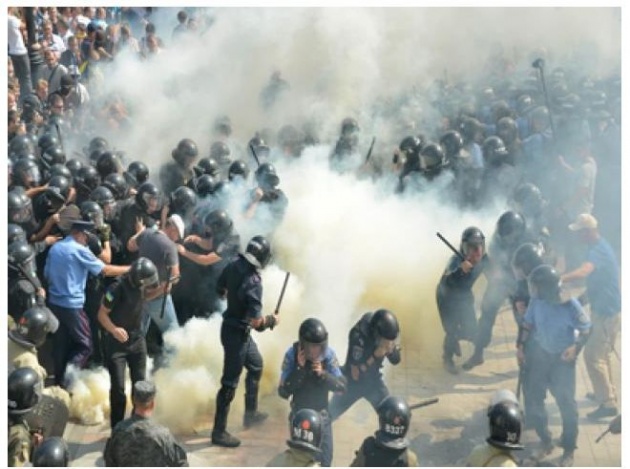
A member of Ukraine’s National Guard was killed and scores of people were injured Monday in clashes between police and nationalist protesters in Kiev as lawmakers gave initial backing to a contested bill boosting autonomy in the country’s breakaway regions.
Major powers voiced deep concern at the bloodshed, which the Ukrainian government blamed on ultra-nationalists.
It was the worst unrest in the capital since a popular uprising ousted Moscow-backed president Viktor Yanukovych early last year, unleashing a separatist insurgency in Ukraine’s industrial east.
Prime Minister Arseniy Yatsenyuk pointed the finger at ultra-nationalists for the violence, which left 125 injured, six seriously, according to the interior ministry.
“At a time when Russia and its bandits are seeking to destroy the country but are unable to do this on the front line, the so-called pro-Ukrainian political forces are trying to open a second front inside the country,” Yatsenyuk said in a nationwide address.
President Petro Poroshenko branded the violence a “stab in the back” and said the perpetrators deserved “severe” punishment.
The European Union, Russia, the United States, France and Germany expressed their disquiet.
“Today’s events are very worrying,” said EU foreign affairs head Federica Mogherini while Russian President Vladimir Putin’s spokesman condemned the “displays of violence” in Kiev.
In Washington, deputy US State Department spokesman Mark Toner said “in a democratic society, grievances must be addressed peacefully and lawfully”.
“We also call for a full investigation into the cause of today’s violence. Those responsible should be held accountable,” Toner said.
Young conscript killed
The violence flared shortly after MPs backed the first reading of constitutional reforms that critics have branded “un-Ukrainian” for giving the Moscow-backed insurgents greater powers in the east.
A total of 265 lawmakers voted in favour of the legislation.
The stormy session saw some MPs angrily try to disrupt the vote, which they condemned as “pro-Vladimir Putin”. Some shouted “Shame!”
The reforms were agreed as part of a February peace deal brokered by Germany and France that called for Kiev to implement decentralisation by year’s end.
Outside parliament, baton-wielding riot police clashed with the protesters.
A loud blast was heard and clouds of black smoke billowed into the air as demonstrators threw what security forces said were grenades.
Some of the injured lay bleeding on the ground in front of the parliament building, with many suffering injuries to their arms and legs. Most of those hurt were in uniform.
The authorities said a member of the National Guard, believed to be a 24-year-old conscript, died of his injuries.
Interior Minister Arsen Avakov initially said he died from a bullet wound to the heart but later revised his remarks, saying he was killed by shrapnel from a grenade.
Avakov said a deputy interior minister was also hurt.
Several journalists were also injured.
Tear gas was used by both sides, an AFP correspondent said.
‘Anti-Ukrainian war’
The interior ministry blamed the nationalist Svoboda party for the unrest, saying those detained included a member of the party’s paramilitary unit, who was accused of throwing the grenade.
“More than 30 people have already been detained. More to come,” Avakov said, adding that people who threw “several” explosive devices were wearing T-shirts with the Svoboda logo.
The authorities seized an F1 anti-personnel grenade at the scene.
Svoboda rejected the accusations, instead blaming the violence on the authorities who it said were the first to use force against the protesters.
The party, led by firebrand nationalist Oleg Tiagnybok, called the explosions a provocation aimed at casting suspicion on “Ukrainian patriots”.
Authorities opened a criminal probe into the clashes.
“Investigation and punishment will be unavoidable,” Avakov said, calling the clashes an “anti-Ukrainian war”.
Controversial legislation
The bill on increased autonomy for Ukraine’s regions has sparked heated debate in Ukraine where opponents see it as an attempt to legalise the seizure by Russian-backed rebels of the eastern Donetsk and Lugansk regions.
The second reading of the legislation is expected by the end of the year. It will need a two-thirds majority of 450 lawmakers to pass that stage.
Kiev’s Western allies see the reforms as a chance to end the armed conflict in the east that has claimed more than 6,800 lives over the past 16 months.
Contrary to the expectations of separatists, the legislation does not definitively grant the industrial east the semi-autonomous status the insurgents are seeking.
The Russian-speaking regions—which are dotted with war-shattered steel mills and coal mines that once fuelled Ukraine’s economy—want their special status spelt out in constitutional amendments that would be very hard to overturn.
Kiev and the West accuse Russia of backing the rebels with weapons, troops and military advisors, claims the Kremlin denies.
Russia on Friday dismissed the autonomy measures voted on in Kiev as merely an “imitation” of compliance with the February peace deal.
The ceasefire agreed in the Belarus capital Minsk led to a marked de-escalation in fighting but deadly clashes still frequently erupt along the frontline.



